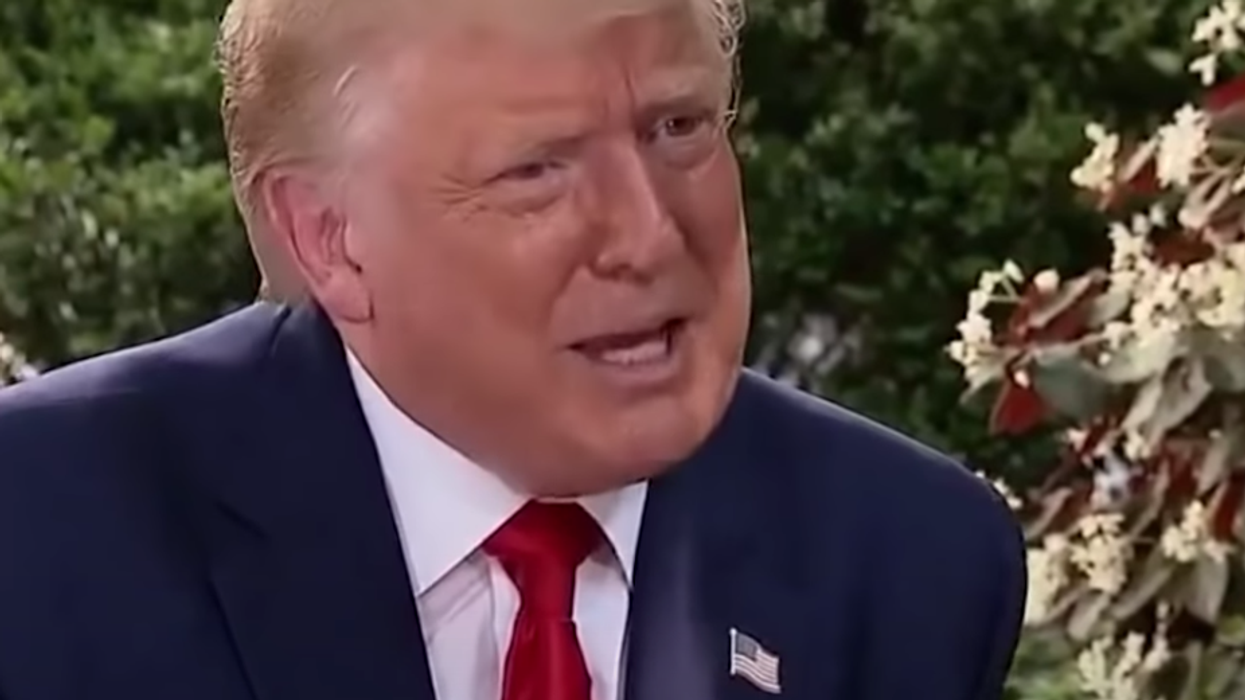
Reprinted with permission from MediaMatters
It's been more than five years since Donald Trump rode down the golden escalator of his eponymous New York City tower to a crowd containing actors paid to cheer for him. There, he announced his campaign for president. As months passed, it became clear that Trump had a legitimate shot at winning the Republican nomination while running a campaign filled with racist invective and incoherent policy goals. He was not presidential in any sense of the word, and mainstream news outlets struggled to come to terms with that.
Perhaps as a coping mechanism, playing to their own normalcy biases, the press desperately tried to find any glimmer of hope that the Republican frontrunner might not actually be the Trump that was barnstorming the country. Perhaps there was a different Trump beneath the surface. Perhaps, as candidates of the past had, Trump would become more moderate as he moved to win over voters across the political spectrum during the general election.
Whatever subconscious reason for it, many in the media projected their own desire for normalcy onto a Trump avatar. Words like "pivot" were thrown around on such a regular basis that "here comes the pivot" became a joke by the campaign's end. No pivot came. Then there was speculation that perhaps the presidency itself would inspire a more serious and sober Trump to emerge. That didn't happen, either.
Fast forward five years and journalists and commentators are still talking about imminent pivots and praising him for always-temporary changes in his tone.
Five years of the media obsessing over Trump changing his “tone"www.youtube.com
CNN's Wolf Blitzer asked whether people could expect to see "a less blunt, less angry Donald Trump" in February 2016, less than two months after Trump called for "a total and complete shutdown of Muslims entering the United States."
A few days later, CNN's Dana Bash commented that she was "struck at how different his demeanor" was during an interview she conducted with Trump. During the interview, Bash gushed over Trump's supposed restraint in the previous few days. "I kind of want to ask who are you and what have you done with Donald Trump?" she joked before adding, "You really have seem to have changed your tone. You have gone back to basics. You're really not engaging, even when people engage you and talk about the fact that you're a counter-puncher, it's not happening now."
Bash's interview was a day after a debate in which Trump promised to "bring back a hell of a lot worse than waterboarding" to torture enemy combatants. This, somehow, fit in with the "changed … tone" Bash mentioned.
On April 20, 2016, Tom Llamas of ABC's World News Tonight with David Muir lauded Trump's "more serious tone" and "more presidential style." What did Trump do to earn this praise? During a primary victory speech, he referred to Sen. Ted Cruz (R-TX) as "Senator Cruz" instead of "Lyin' Ted," a nickname he'd been throwing around for a while at that point. The same segment showed Trump almost immediately returning to his insult-slinging ways at his very next event, but for some reason, his ability to be temporarily polite was worthy of ABC's applause. Reporting on the same speech over at CNN, Jason Carroll said that Trump's win in the New York primary was "signaling a new phase in his campaign" because he was "dropping most of the insults and sounding more presidential." In yet another segment, CNN's Brooke Baldwin said that Trump was "appearing less combative, more presidential."
"Get ready for the new Donald Trump," MSNBC's Mika Brzezinski said on the May 4, 2016, edition of Morning Joe, calling Trump's tone as evidence of "the beginning of a massive pivot" to the general election.
These clips are just the tip of the example iceberg, but hopefully help illustrate how far back the search for Trump's "new tone" goes.
Political analysts' compulsive need to grade Trump on a curve has made much of their work worthless. For instance, look at the coverage of Trump's address to a joint session of Congress on February 28, 2017. Ahead of the speech, CNN repeatedly referred to the address as an opportunity to "reset" his presidency. Immediately following the speech, mainstream outlets confirmed this hypothesis. "We saw the long-awaited pivot," said ABC's Alex Castellanos. "For the first time, I'm hearing people say he looked and sounded presidential," said CBS' Gayle King.
The most infamous and mockable moment came when CNN's Van Jones gushed about how Trump "became president" that night.
VAN JONES: He became president of the United States in that moment. Period. There are a lot of people who have a lot of reason to be frustrated with him, to be fearful of him, to be mad at him. But that was one of the most extraordinary moments you have ever seen in American politics, period. And he did something extraordinary, and for people who have been hoping that he would become unifying, hoping that he might find some way to become presidential, they should be happy with that moment.
All of these professional analysts and journalists were put to absolute shame by a prescient woman in a CBS focus group.
"That's not the Donald Trump that I've seen for the past 30 days," she said. "Where is that guy? Where's that guy that says what he wants to say, that is loud, that says everything is fake news? Where's that guy? … I'm going to look for him on Twitter tomorrow and see what he really thinks. Great job to the speechwriter, but I will see Donald Trump at 12 a.m."
She called it. Just four days later, Trump accused former President Barack Obama of having his "wires tapped" in the Trump Tower. "This is McCarthyism!" Trump tweeted, calling Obama, "Bad (or sick) guy!"
This example raises an important question. How are people whose entire livelihood revolves around following politics less in tune with current events than a focus group member whose life presumably doesn't involve the non-stop consumption of political news? It comes down to a desire for something resembling a normal world with a normal president.
Members of the press contort themselves in an effort to find something positive they can say about Trump, and that often comes at the expense of accurately portraying what's happening in the world. Instead of providing context for what is happening, these analysts find still frames completely detached from time and meaning from the Trump presidency. That's not good journalism. If a food critic goes to a restaurant three times and gets food poisoning twice, would it make sense for them to separate the one trip that didn't make them sick for its own four-star review? Of course not. Honest journalism relies on adding context that lets you know that the time you don't get food poisoning is an aberration and not an excuse to ignore the bad.
In March this year, media outlets again tried to give Trump credit for a supposedly "new tone."
The Associated Press published an article titled "Trump changes his tone, gets real on the coronavirus threat" on March 17. Though it noted that the change in tone lasted a day, the article claimed that "it signaled an urgent new White House response to a crisis that's upending American society."
He called on the country to come together. He warned of pain to come. And he deferred to the nation's public health experts while at least momentarily putting aside petty squabbling.
After weeks of trying to play down the risk posed by the coronavirus pandemic, President Donald Trump struck a more urgent tone Monday as he delivered a sobering message to Americans grappling with a new reality that will dramatically alter their lives for months to come.
The change in tone lasted a day. But it signaled an urgent new White House response to a crisis that's upending American society.
During the March 17 edition of CNN's Right Now with Brianna Keilar, more than three years after she praised Trump's shift in tone on the campaign trail, Dana Bash called Trump's coronavirus press conference "remarkable" and something "to applaud." "He is being the kind of leader that people need, at least in tone, today, and yesterday, in tone that people need and want and yearn for in times of crisis and uncertainty."
On March 18, USA Today published a piece that mentioned Trump's remark about a conversation he had with his son Barron who had asked him about the pandemic. Trump said he had replied, "It's bad. But we're going to be hopefully a best case, not a worst case." The piece said Trump's "invocation of his son" was the "latest demonstration of a shift in tone for a president who once described concerns over the public health crisis as a 'hoax' and who has often mocked the idea of sounding 'presidential.'"
A couple weeks later, reporters once again credited Trump for being "realistic" and "sober" during a taskforce press conference.
Last week, reporters were again eager to praise Trump for a "new tone," this time for acknowledging that the pandemic is likely to "get worse before it gets better," an episode that probably set off a bit of deja vu in anyone who watched the mid-March applause he got for finally taking it seriously -- supposedly.
It's not enough for news outlets to report on isolated moments of lucidity from the president. Instead, journalists need to take the extra step of providing basic context for what they're reporting on. Rather than churning out thousands of words about a shift in tone or a "pivot" every few weeks with the same level of credulity they'd have afforded past presidents, they need to understand that snapshot reporting like that only misinforms audiences and further erodes trust in the news media. For the sake of their audiences, for the sake of democracy, and for the sake of the press as an institution, they must start doing their jobs and reporting on reality as it is and not simply what they wish it was.
- Leaked White House Memo Shows Trump Lied About Virus Ebbing ... ›
- Taunting Trump: How The Campaign To 'Not Normalize' Donald Is ... ›
- Truth Disappears Fast: Journalism In Pandemic And War - National Memo ›
- Trump (And Fox) Revert To Blaming ’The Media’ For His Woes - National Memo ›








